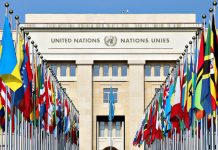Foreign Desk Report
TEHRAN: Iran’s Foreign Minister Hossein Amirabdollahian said he believed in the importance of a broad regional dialogue that included Saudi Arabia, Egypt and Turkey to solve the region’s problems.
The minister added that ongoing dialogue with Saudi Arabia was positive and constructive and Tehran was ready to restore relations at any time,
After years of looking abroad for answers, countries in the Middle East now appear to instead be talking to each other to find solutions following two decades defined by war and political upheaval.
The diplomatic maneuvering signals a growing realization across the region that America’s interest is moving elsewhere and that now is the time for negotiations that were unthinkable just a year ago.
The American withdrawals from Afghanistan and Iraq have played a part in the change in the region. Once ostracized autocracies such as Bashar Assad in Syria, and shunned former top figures such as Moammar Gadhafi’s son in Libya, are back in the political arena amid the still smoldering ruins of the 2011 Arab Spring uprisings.
Syria’s Assad has clawed his way back from the precipice. Though the northwestern Syrian province of Idlib remains under the control of opposition forces, Assad controls the rest of the country.
Much remains unsettled and this inward search may not provide the answers most want.
The United States still maintains a strong military presence, including bases across the wider Middle East. But its allies also watched in stunned horror as desperate people clung to the sides of departing U.S. military cargo jets during America’s chaotic withdrawal from Afghanistan after 20 years of war and the Taliban takeover of the country.
And with the border-locking chaos of the coronavirus pandemic largely behind them, Middle Eastern leaders are now shuffling, talking face-to-face amid a flurry of diplomatic meetings, seemingly eager to hedge their bets.


